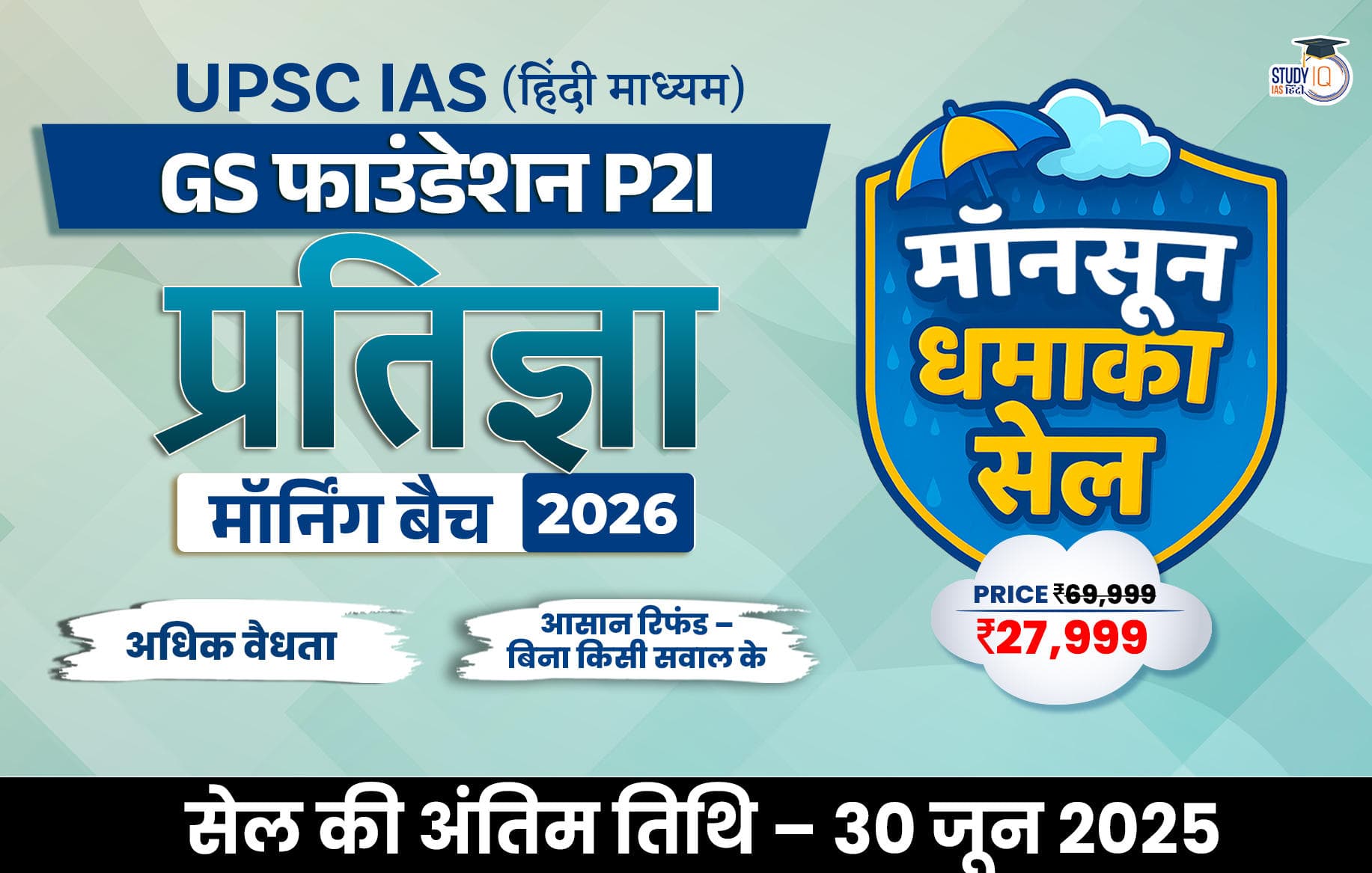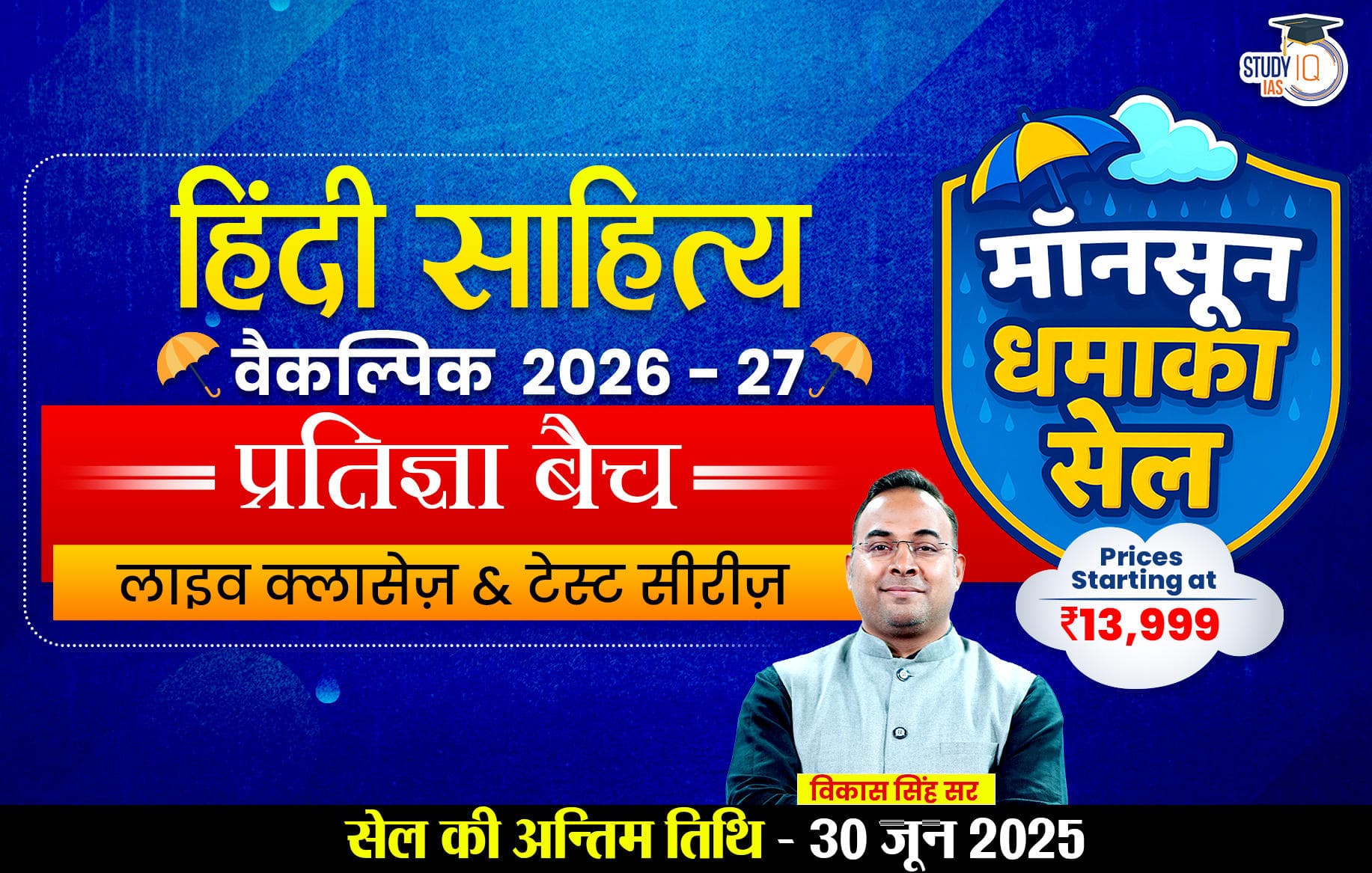Table of Contents
Union Council of Minister
According to Article 74 of the Constitution, there shall be a Council of Ministers, headed by the Prime Minister, to assist and advise the President, who shall follow their recommendations when performing his duties. The Prime Minister and other Ministers make up the Council of Ministers. The three categories of ministers are Deputy Ministers, Ministers of State, and Cabinet Ministers.
The Union Council of Minister of India is an important part of Indian Polity which an important subject in UPSC Syllabus. Students can also go for UPSC Mock Test to get more accuracy in their preparations.
Union Council of Minister History
The Indian Constitution has adopted the British parliamentary system of government, in which the Council of Ministers, which is presided over by the Prime Minister was introduced. Lord Canning began it with the Indian Councils Act of 1861.
Union Council of Minister Constitutional Provisions
Council of Ministers is instructed to assist and advise the President in Article 74. In accordance with clause (1), a Council of Ministers led by the Prime Minister shall assist and advise the President, who shall act in accordance with their recommendations while carrying out his duties.
With the caveat that the President may ask the Council of Ministers to reevaluate such advise, generally speaking or otherwise, and that the President shall act in accordance with the advice presented after such reconsideration. In accordance with clause (2), no court shall investigate as to whether any, and if so, what, advice was provided to the President by Ministers.
The Prime Minister shall be selected by the President, and the other Ministers shall be appointed by the President on the advice of the Prime Minister, according to Article 75(1) of the Constitution.”
Union Council of Minister and Article 75
A maximum of 15% of the total members of the House of the People may serve as ministers, including the prime minister, in the Union Council of Minister. The term of office for ministers is determined by the President’s will. The House of the People is ultimately responsible to the Council of Ministers. The President administers the oath of office and secrecy to a minister before he assumes his position using the forms specified in the third Schedule.
The salaries and allowances of ministers are as set forth in the Second Schedule until such time as Parliament rules otherwise by law or other means.
For the duration of the period running from the date of his disqualification until the date on which the term of his office as such member would expire or where the member contests any election to either House of Parliament before the expiration of such period, a member of either House of the Parliament belonging to any political party is disqualified from being a member of that house under the 10th Schedule shall also be disqualified to be appointed as a minister under clause (1).
A minister ceases to be a minister at the end of any six-month term during which he or she is not a member of either House of the Parliament.
Union Council of Minister Related Article
| Article | Provision |
| Article 77 | The way the Indian government operates. |
| Article 78 | Duties of the prime minister with regards to providing the president with information, etc. |
| Article 88 | Ministers’ rights with regard to the Houses. |
Union Council Of Ministers Formation
The President’s appointment of the Prime Minister marks the start of the Council of Ministers creation process. The President will have little opportunity to use his own judgment when choosing the Prime Minister. He must be the party’s leader if it wins a majority in the Lok Sabha.
The President may exercise some discretion within the limitations of conventions only when none of the parties represented in the Lok Sabha commands a clear majority. In actuality, the Prime Minister has complete discretion over the section of other Ministers. The President must only accept the Prime Minister’s suggestions. Other Ministers are chosen by the Prime Minister. The President must accept the group he selected.
Union Council Of Ministers Qualification
Any member of either House of Parliament must be a minister. If someone who is not a member of either House of the Parliament is appointed as a minister, that person will lose that position after six months, unless they are required to run for election to one of the Houses of Parliament within that time frame.
Union Council of Minister Disqualification
Additionally, a member of parliament who was expelled for defecting would not be qualified to serve as a minister. But he will be qualified to become a minister if he wins the next newly held Parliamentary election.
Union Council of Minister in Parliamentary Proceeding
Members of either House may be chosen as ministers. A Minister who is a member of one chamber has the right to speak in and participate in the activities of the other House, but he or she does not have the right to vote in that chamber.
Union Council of Minister Salary
According to the constitution, ministers receive salaries and benefits that may occasionally be set by law by the Parliament. Each minister is entitled to the same pay and benefits as a member of Parliament as a result of a statute passed by Parliament in 1985.
Union Council of Minister Strength
The Constitution makes no indication of its size or classification. The Prime Minister sets its dimensions based on the demands of the moment and the circumstances. However, in accordance with the 91st Constitutional Amendment Act of 2003, it cannot exceed 15% of the Lok Sabha’s total membership.
Union Council of Minister Term of Office
The President appoints ministers, who serve at his pleasure. If they continue to enjoy the majority’s backing in the Lok Sabha, then it means something. The Prime Minister may at any time request the resignation of any minister, and that minister must comply. Any minister may be dismissed at the Prime Minister’s discretion, and the President is obligated to heed his recommendations. The whole Council of Ministers leaves office along with the Prime Minister when he resigns.
As a result, the tenure of the ministry or a minister is not set. As long as the majority of the Lok Sabha has confidence in the government or minister in question, or as long as the Prime Minister doesn’t resign, they remain in office. A minister may serve in that capacity for a maximum of five years, or one full Lok Sabha term. After every new general election to the Lok Sabha, a new government must be established, even if the same party that won a majority in the previous Lok Sabha returns with a majority in the next Lok Sabha.
Union Council of Minister Power
Executive Power
All executive duties of the President of India are carried out by the Council of Ministers. The policies that will be submitted to Parliament for approval are created by the Cabinet. It adopts these measures after getting the consent of the Parliament. It administers the Union in accordance with approved policies.
The Cabinet/Prime Minister oversees and coordinates all government ministries. All domestic policies deemed critical for the general development of the nation are to be developed by the Cabinet. The Lok Sabha holds the Council of Ministers jointly and severally liable for all of its policies and choices. Any setback might spell the end for the ministry on any front.
Emergency Power
When exercising his emergency powers, the President always follows the advice of the Prime Minister and his council of ministers. The President may only declare an emergency with the consent of the Cabinet. He acts in accordance with the advice of the Prime Minister and his Council of Ministers to resolve the emergency.
Legislative Power
The Council of Ministers is crucial to the legislative process even though Parliament has the authority to enact laws for the Union. Ministers are both the leaders of government ministries and members of the Parliament. They actively and completely take part in the legislative process.
The majority of the measures are authored and introduced by them. The government’s activity, which is controlled by ministers, occupies 95% of the time when the Parliament is in session. A bill that is not supported by the Council of Ministers cannot be passed because the ministry has the support of the majority of members of Parliament.
The whole Council of Ministers resigns if the Lok Sabha approves a measure that the Council of Ministers opposes, rejects a bill that the Council of Ministers favours, or approves the Cabinet’s budget. This is regarded as a vote of no confidence in the administration. While doing so, the President may receive a recommendation from the Prime Minister or Cabinet to dissolve the Lok Sabha.
Union Council of Ministers Responsibilities
Collective Responsibility
The fundamental tenet of the Cabinet or Parliamentary form of government is shared responsibility. The approved behavior of Government Ministers in their capacity as members of the Cabinet is referred to as collective cabinet responsibility. It operates in England according to recognized customs. This idea is upheld in India by adding specific clauses to the Constitution. The Council of Ministers is collectively accountable to the House of the People, according to Article 75(3).”
As long as the House of People continues to have confidence in the administration, which can be presumed unless and until shown otherwise by a confidence vote, the government may continue in power. Therefore, the entire Council of Ministers resigns if a single Ministry’s decision on a policy subject is opposed in the Lok Sabha, not just the Minister. Together, the Council of Ministers swims and sinks. Together, it either stands or falls.
The individual Ministers may disagree with one another on particular subjects, but once the Cabinet makes a decision, all the Ministers agree to it. Each and every Minister has a responsibility to uphold it and lend it support both inside and outside of Parliament. A minister must resign if he disagrees with a cabinet decision and is unwilling to defend it. Due to differences with his colleagues about the Hindu Code Bill, B.R. Ambedkar resigned in 1953.
Arif Mohammed resigned as a result of his opposition to the Muslim Women (Protection of Rights on Divorce) Act of 1986. The fundamental purpose of the notion of collective responsibility is to give the Cabinet cohesion and uniformity so that government operations are not slowed down.
Individual Responsibility
Despite having a collective responsibility to the Lok Sabha, each Minister will also have a personal responsibility to the President, who is the head of state. The Ministers are subject to removal by the President at any moment, according to Article 75(2). However, as the President is required to follow the Prime Minister’s recommendations, the Prime Minister really uses this authority. The Minister is asked to resign by the Prime Minister.
No Legal Responsibility
The Indian Constitution does not specify a system of legal accountability. In the UK, a minister who is legally accountable for the act must countersign each public act the monarch performs. The minister will face legal repercussions if the act is illegal. In India, a minister should not countersign a presidential order for a public act. The President is free to establish the procedures for authenticating his directives. Additionally, the courts are prohibited from looking into the type of advice given by ministers.
Position of the Council of Ministers
The Council of Ministers has a vital and central function as the actual and powerful executive in the Indian political system. All of the President of India’s authority is actually exercised by the Council of Ministers. The Council of Ministers’ Cabinet is its most potent member. The central institution is in charge of exercising all of these authorities. The formations of national policies as well as the administration’s activities are under the direction, supervision, and control of the Cabinet.
The Cabinet holds an enviable position as the creator of all policies, the head of administration, and the supreme coordinator of government action. In fact, it serves as the state ship’s rudder. It is the most potent institution and the hub of power in the Indian political system.
Union Council of Ministers UPSC
This article can understand that the council of ministers is the body of ministers in the parliament, which has many organs and the cabinet is one of these organs. The cabinet is the council’s core but is much smaller in number. To sum up, the council of ministers is the nominal decision-making body that is larger in size. The cabinet is the actual decision-making body that is smaller in size but holds the key portfolios. Students can read all the details related to UPSC by visiting the official website of StudyIQ UPSC Online Coaching.

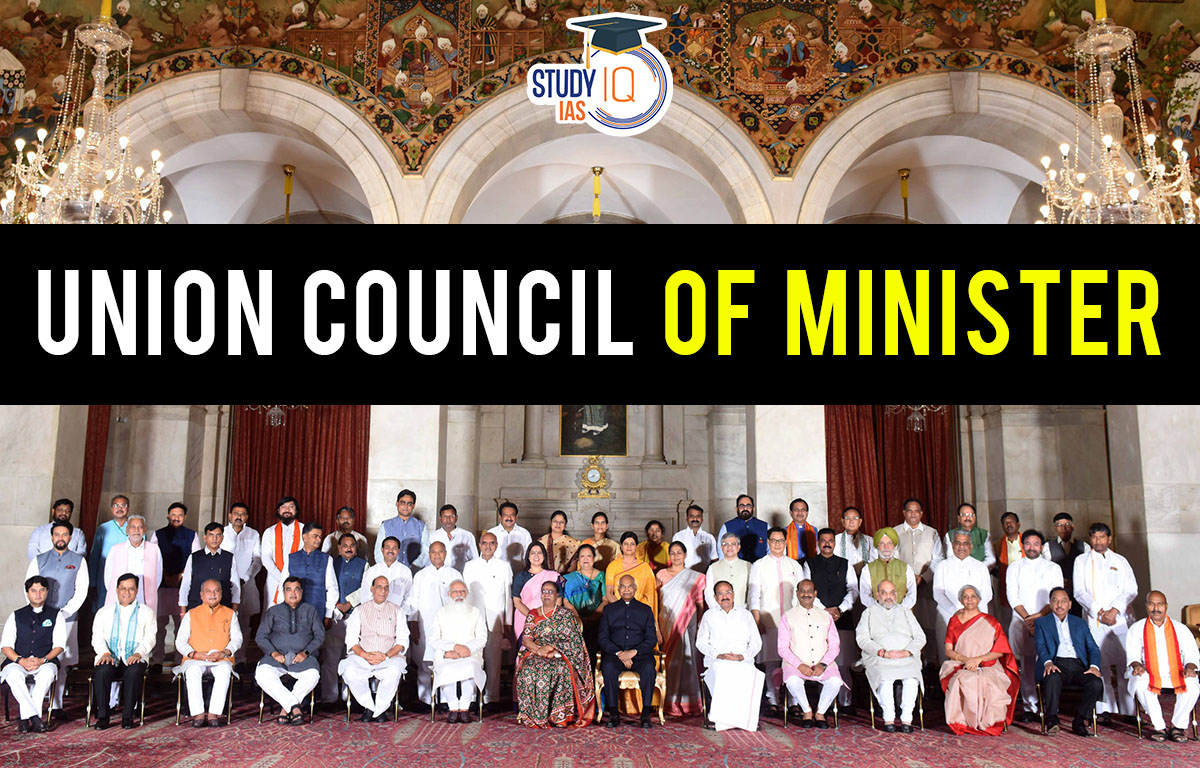
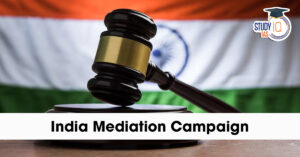 India Mediation Campaign, Objectives, Pr...
India Mediation Campaign, Objectives, Pr...
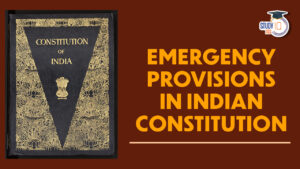 Emergency Provisions in Indian Constitut...
Emergency Provisions in Indian Constitut...
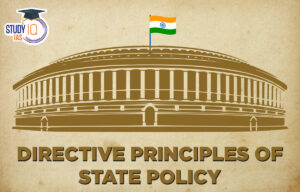 Directive Principles of State Policy (DP...
Directive Principles of State Policy (DP...


